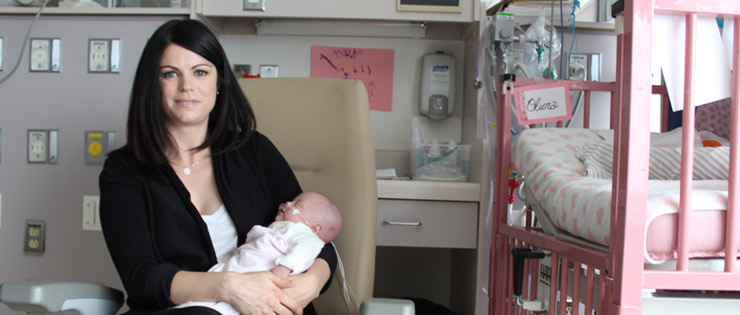Newsroom
Could stem cells fight lung disease in our tiniest patients?
June 15, 2017

Dr. Bernard Thébaud and his team are hoping to harness stem cells from umbilical cords to treat chronic lung diseases in extremely premature babies like Olivia Eberts. “She’s a miracle because she wasn’t expected to survive,” said her mother, Jamie-Lee Eberts.
From the day she was born, Olivia Eberts has been a fighter. Born 115 days before her due date, at 23 weeks and 4 days, she has persevered through a heart surgery and multiple health problems.
“She’s a miracle because she wasn’t expected to survive,” said her mother, Jamie-Lee Eberts. “It’s going to be a lifelong battle for her, and we don’t know what the future may bring.”
Unfortunately some of the breathing equipment that helped keep Olivia alive has damaged her developing lungs, causing a chronic condition called Bronchopulmonary dysplasia (BPD).
She is one of the 1,000 babies born prematurely in Canada every year who will be diagnosed with BPD. This condition harms the brain and stunts growth, and complications can lead to blindness or cerebral palsy. There is no cure.
Dr. Bernard Thébaud wants to change that. The neonatologist and senior scientist at The Ottawa Hospital and CHEO is working on a therapy for BPD based on umbilical cord stem cells.
“What we see in the lab is very promising,” said Dr. Thébaud, also a professor at the University of Ottawa. “We think stem cells are going to be a game-changer for these babies.”
Dr. Thébaud’s team discovered that stem cells from umbilical cords could prevent and even repair lung damage in animal models of BPD. The cells act like mini pharmacies, diagnosing the problem at hand and dispensing the appropriate healing factors.
Now his goal is to bring this discovery to the sick babies he sees every day through a clinical trial, which he hopes to launch in the near future. His team recently received a grant from the Ontario Institute for Regenerative Medicine that will help them do the necessary research to prepare for just such a trial.
"I am confident that we have the talent and the tools here to find a treatment for BPD,” said Dr. Thébaud. “I moved to Ottawa specifically to drive stem cell treatments to the clinic. Step by step, our findings are helping us get there."
The Ottawa Hospital: Inspired by research. Driven by compassion
The Ottawa Hospital is one of Canada’s largest learning and research hospitals with over 1,100 beds, approximately 12,000 staff and an annual budget of over $1.2 billion. Our focus on research and learning helps us develop new and innovative ways to treat patients and improve care. As a multi-campus hospital, affiliated with the University of Ottawa, we deliver specialized care to the Eastern Ontario region, but our techniques and research discoveries are adopted around the world. We engage the community at all levels to support our vision for better patient care. See www.ohri.ca for more information about research at The Ottawa Hospital.
University of Ottawa: —A crossroads of cultures and ideas
The University of Ottawa is home to over 50,000 students, faculty and staff, who live, work and study in both French and English. Our campus is a crossroads of cultures and ideas, where bold minds come together to inspire game-changing ideas. We are one of Canada’s top 10 research universities—our professors and researchers explore new approaches to today’s challenges. One of a handful of Canadian universities ranked among the top 200 in the world, we attract exceptional thinkers and welcome diverse perspectives from across the globe. www.uottawa.ca
Media Contact
Amelia Buchanan
Senior Communication Specialist
Ottawa Hospital Research Institute
Office: 613-798-5555 x 73687
Cell: 613-297-8315
ambuchanan@ohri.ca
